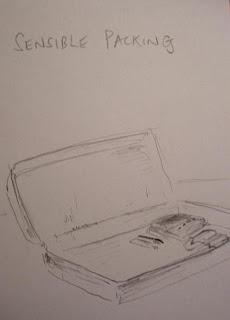 I'm sure the glimpse of Mapp and Lucia got you all happy and either nostalgic or full of anticipation for the future. Well, the end is not yet in sight. I mentioned Tom Holt's much-loved sequels to the Benson novels - well, there will soon be another volume to add to the flock, to mix metaphors. Step forward Guy Fraser-Sampson, and Major Benjy...
I'm sure the glimpse of Mapp and Lucia got you all happy and either nostalgic or full of anticipation for the future. Well, the end is not yet in sight. I mentioned Tom Holt's much-loved sequels to the Benson novels - well, there will soon be another volume to add to the flock, to mix metaphors. Step forward Guy Fraser-Sampson, and Major Benjy...
I've been in touch with Guy, and asked him to tell us a little about it all...
-Start with a brief biog, about 40 words, perhaps?
[Guy Fraser-Sampson] Hard on the heels of Sebastian Faulks’s re-launch of James Bond comes resurrectionist news of a very different ilk. Guy Fraser-Sampson, until now known as a best-selling non-fiction author, has written a new Mapp and Lucia book with the full blessing of E.F. Benson’s estate. “Major Benjy” will be published by Troubador on 1 September and will be eagerly awaited by fans around the world, as the original books (made into an equally popular TV series some years back) still command a huge cult following.
-So, how did you first come across EF Benson's Mapp & Lucia series?
[Guy Fraser-Sampson] At the age of 10, listening to “A Book at Bedtime” under the bedclothes! I have to admit, though, that I appreciated them more the older I got. I have re-read them all repeatedly over the years.
-Ok, imagine I've never read any of them - who are Mapp & Lucia, and what are the books about?
[Guy Fraser-Sampson] Fred Benson wrote both “Queen Lucia” and “Miss Mapp” as single books, but then later had the stroke of genius to bring these two dreadful women together, set them up in opposition to each other, and turn it into a series. Set in the mythical town of Tilling (in fact Rye , where Benson lived) they are constantly attempting to out-do and out-wit each other with hilarious results. With the sole exception of Jeeves and Wooster , it must be the most enduring series of comic fiction ever published. It retains a huge cult following to this day, with countless internet fan groups, local clubs and a grand gathering in Rye every September.
-So - where does 'Major Benjy' fit in?
[Guy Fraser-Sampson] “Major Benjy” is slightly unusual in that it is not a sequel in the true sense. It fits into a narrative gap between two of the existing books (“Miss Mapp” and “Mapp and Lucia”) and ties up a lot of loose ends in the process.
-What do you EF Benson would think of them?
[Guy Fraser-Sampson] That’s not really for me to say, but my instinct is that he would love “Major Benjy”. There was a lot of stuff he could not expressly articulate at the time – about gay relationships for example – which I can state, albeit very gently. In addition, I have fleshed out the supporting cast which even his fans admit was a bit of a weak point with Fred himself.
-And the questions to which I always want to know the answer at Stuck-in-a-Book - who are some of your favourite authors?
[Guy Fraser-Sampson] That’s a big question since I don’t have TV and have always been a voracious reader. I consume several books a week. For fiction other than Benson: Durrell, Farrell, O’Brian, Burgess, Davies and Rushdie. For unjustly neglected novelists I would say Hamilton and Raymond (though I see their work is now being re-printed) Derek Robinson and Frank McGillion. For lighter reading, I enjoy Vargas, Pryce, Perez-Reverte, and de Berniere’s South American trilogy.
-what book are you reading at the moment?
[Guy Fraser-Sampson] “Murther and Walking Spirits” by Robertson Davies, bought in a second-hand bookshop in Lyme Regis. I am also re-reading Tilling on Forster and Forster’s “Abinger Harvest”, both bought from my local book stall at Swiss Cottage market. Ditto “Cultural Amnesia” by Clive James bought from Daunt Books in Marylebone.
-And how can I buy a copy of Major Benjy?
[Guy Fraser-Sampson] There have already been some good orders from independent bookshops all over the UK , so please check your local bookshop first. If not, go to http://www.troubador.co.uk For US and Canadian readers, the best option is probably Amazon unless you happen to live near a large bookstore.
 I do believe it's Thursday, and thus Booking Through Thursday time. This week's question:
I do believe it's Thursday, and thus Booking Through Thursday time. This week's question:







































